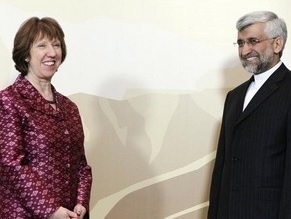|
World Jewish News

Iranian negotiator Saeed Jalili and EU's Catherine Ashton at nuclear talks, April 5, 2013. Photo: REUTERS/Shamil Zhumatov
|
Talks on Iran’s nuclear programme in Almaty fail again
08.04.2013, Israel Iran and six world powers (China, France, Germany, Russia, the United Kingdom and the United States), who met in Almaty, capital of Kazakhstan, failed to reach agreement Saturday on how to address the international community's fears that Tehran might use its nuclear technology to make weapons.
"Over two days of talks, we had long and intensive discussions on the issues addressed in our confidence-building proposal put forward during the last round of talks with Iran in Almaty on 26-27 February. It became clear that the positions of the E3+3 and Iran remain far apart on the substance," said EU foreign policy chief Catherine Ashton, who convened the meeting.
"What matters in the end is substance. We are still a considerable distance apart," she said at a press conference after the meeting.
She said negotiators would now consult with their capitals."We have agreed that all sides will go back to capitals to evaluate where we stand in the process. I will be in touch with Dr. Saedd Jalili (the Iranian negotiator) soon in order to see how to go forward."
But she made no mention of plans for new talks, another sign that the gap dividing the two sides remains substantial.
Jalili spoke of "some distance between the positions of the two sides." He suggested Iran was ready to discuss meeting a key demand of the other side -- cutting back its highest-grade uranium enrichment production and stockpile -- but only if the six reciprocated with rewards far greater than they are now willing to give.
While no breakthrough had been expected, the lack of forward movement in international negotiations that started a decade ago was certain to increase concerns that diplomacy was ineffective as a tool to stop Iran from moving toward nuclear-weapon making capacity.
Israel, which is the most worried, says Iran is only a few months away from the threshold of having material to turn into a bomb and has vowed to use all means to prevent it from reaching that point. The U.S. has not said what its "red line" is, but has said it will not tolerate an Iran armed with nuclear weapons.
"The Iranians are using the round of talks to pave the way toward a nuclear bomb," said Yuval Steinitz, the Israeli minister for intelligence and strategic affairs, adding that Israel “has already warned that the Iranians are taking advantage of the rounds of talks in order to buy time to advance in uranium enrichment, step by step, toward a nuclear weapon."
At the Almaty talks, the U.S., Russia, China, Britain, France and Germany were asking Tehran to greatly limit its production and stockpiling of uranium enriched to 20 percent, which is just a technical step away from weapons-grade uranium. That would keep Iran's supply below the amount needed for further processing into a weapon.
But the group views that only as a first step in a process. Iran is operating more than 10,000 centrifuges. While most are enriching below 20 percent, this material, too could be turned into weapons-grade uranium, although with greater effort than is the case for the 20-percent stockpile.
Tehran also is only a few years away from completing a reactor that will produce plutonium, another pathway to nuclear arms.
by: Yossi Lempkowicz
EJP
|
|
